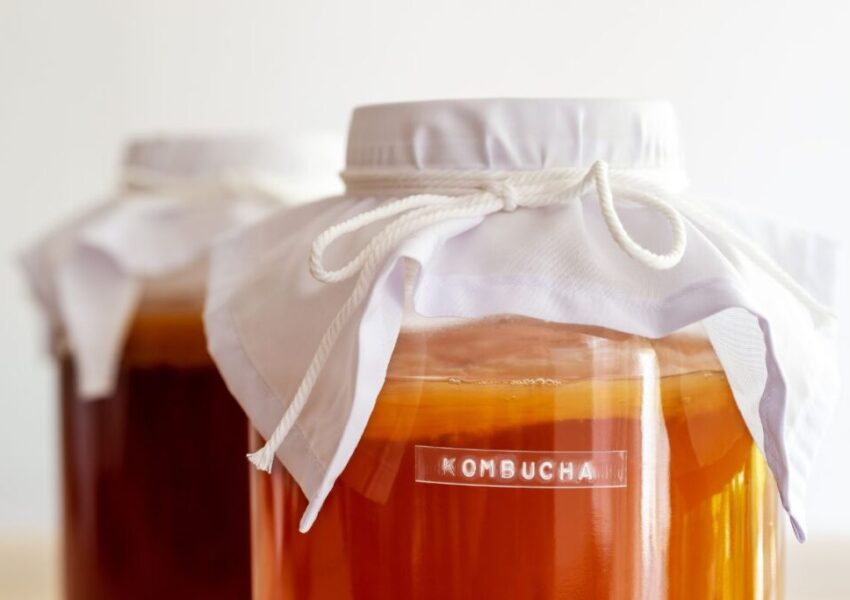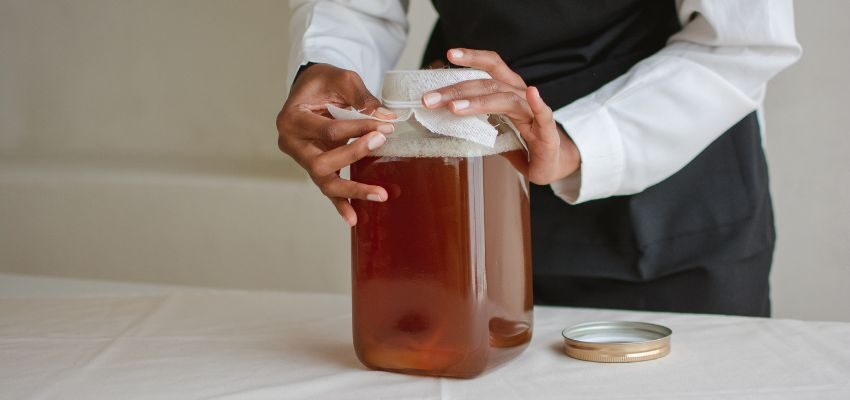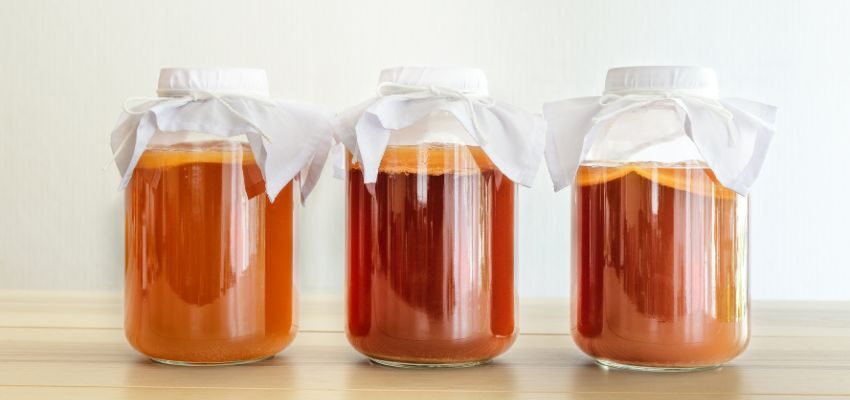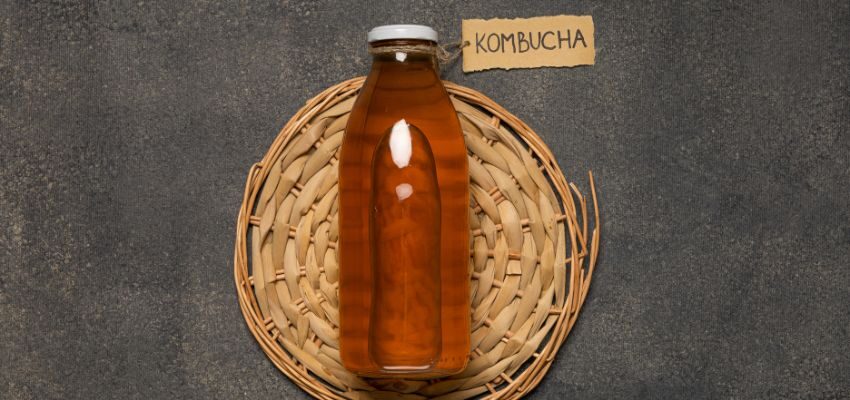How Long Is Kombucha Good For After Opening?

Published April 9, 2024
Kombucha is an effervescent, fermented tea-based beverage that has become very popular due to its tangy flavor and potential health benefits. But enthusiasts often wonder: After brewing or buying Kombucha, how long can one enjoy it before it spoils?
In this article, we’ll take a closer look into the shelf life of Kombucha. Let’s examine proper storage techniques, how long is Kombucha good for after opened, and indicators that signal it’s time to bid farewell to your brew.
What Is Kombucha?
Kombucha is a delicately effervescent beverage known for its unique flavor and potential health perks. The symbiotic culture of bacteria and yeast (SCOBY) ferments sweet tea to create the beverage.
The natural fermentation process produces a drink with a distinctive tangy taste. Many believe Kombucha, a blend of tradition and modernity, provides health benefits through probiotics and antioxidants.

Preparation Process Of Kombucha
Preparing Kombucha starts by brewing sweetened black or green tea. This tea is mixed with a culture called SCOBY and left to ferment at room temperature for one to two weeks.
The SCOBY breaks down the tea’s sugars during fermentation, producing vinegar and acidic compounds. The process also generates gasses that create the beverage’s carbonation and mild alcohol content. Over time, the intricate transformation gives Kombucha its distinctive tangy flavor profile.
Lifespan Of Bottled Kombucha
If you’re wondering how long is Kombucha good for after opened, it has a lengthy shelf life. Due to its high acidity, bottled Kombucha can remain fresh for 6 to 8 months when stored correctly in the refrigerator. The bacteria and yeast in Kombucha are beneficial. They improve its unique flavor and prevent spoilage. The microorganisms create a harsh environment for harmful bacteria, ensuring the beverage’s longevity and quality over time.
An opened bottle of Kombucha is best enjoyed within a week for peak freshness. To restore lost carbonation, especially if it goes flat, try leaving it out of the fridge for a day or two. This will restore the carbonation. Refrigerate promptly to avoid contamination that can affect both taste and safety.

Indications Of Spoiled Kombucha
Can Kombucha go bad? Identifying if your Kombucha has spoiled is vital to enjoying its benefits safely. Here are the essential indicators to look for:
- Mold presence. The appearance of mold is a clear indicator that your Kombucha has gone bad. Harmless yeast formations can look like brown stringy particles or sediments. In contrast, mold is greenish, pinkish, or fuzzy. If you find any unusual colored growths floating in your Kombucha or on the SCOBY, it’s best to discard the entire batch.
- Unpleasant odor. Kombucha naturally smells vinegary from fermentation. But, an overly offensive smell, like spoilage or something “off,” can signal that it’s gone bad. Trust your sense of smell. If it gives off a disagreeable aroma, it’s safer to be cautious and avoid consuming it.
- Excessive tartness or vinegar-like taste. A bit of sourness is standard for Kombucha. But, too much tartness or vinegar taste may mean over-fermentation or spoilage. The flavor can turn unpleasant, and although it may not be harmful, it might not deliver the desired experience.
- Texture changes. Any significant alterations in the texture of the beverage or the SCOBY could indicate spoilage. Fermentation causes changes in texture, but it’s crucial to handle anything that appears significantly different with care.
- Best before date. Kombucha is often fine after its “best before” date. But, storing it for a long time after this date, especially in bad conditions, can raise the risk of spoilage. Consider the storage conditions when deciding if consuming Kombucha is safe past the recommended date.
If uncertain, it’s best to dispose of any kombucha displaying signs of spoilage. Consuming spoiled Kombucha can pose health risks, making safety a top priority.

Proper Storage Of Kombucha
Follow these essential storage tips to preserve your Kombucha’s flavor, quality, and health benefits for a long time.
- Refrigeration is key. Always keep your Kombucha chilled. The cold temperature slows fermentation by deactivating enzymes. Doing so reduces carbonation and acid production. This preserves the flavor and prevents excessive sourness or carbonation.
- Opt for glass bottles. Ideally, store Kombucha in glass. As an inert material, glass prevents chemical leaching and preserves the beverage’s purity and flavor.
- Shield from sunlight. Avoid direct sunlight exposure for your Kombucha. Exposure to sunlight can increase temperature, which speeds up the fermentation process, even if the bottle has a tight seal. A dark, cool cupboard or pantry is ideal until refrigeration.
- Avoid freezing. While chilling is beneficial, freezing is not advisable. Freezing can harm the good bacteria and yeast. This can alter flavor and health benefits when thawed.
- Upright storage. Store Kombucha bottles upright to minimize leakage risk and maintain seal integrity. This position also prevents sediment from disturbing the bottom, keeping the texture clear and consistent.
- Consume fresh. Please remember that it’s best to enjoy Kombucha within a few weeks of brewing or buying it for optimal taste and fizziness. Additionally, once you open it, consume it within a week to savor its peak flavor.
By adhering to these storage guidelines, you can savor your Kombucha at its peak quality for an extended duration.
Frequently Asked Questions About The Lifespan Of Kombucha
Does Kombucha have an expiration date?
Kombucha has an expiration date, yet it boasts a rather lengthy shelf life when stored correctly. The beverage can stay fresh for several months when unopened and kept in the refrigerator. Nonetheless, once opened, its quality will deteriorate at a faster rate.

How long can homemade Kombucha last in comparison to commercial variants?
People usually make Kombucha at home by fermenting it. The fermentation process can last from 7 to 30 days, and the desired level of sourness and the brewing temperature determine the duration. When stored correctly, bottled homemade Kombucha can last 6 to 8 months and still be safe to drink. This is similar to commercial Kombucha, which has a shelf life of 6 to 8 months when unopened and refrigerated.
Does the type of Kombucha affect its shelf life?
The variety of Kombucha can impact its shelf life. Kombucha with fruit juices or purees might have a slightly shorter shelf life because of the extra sugars that can ferment. Even so, the general rules for storing and consuming Kombucha apply to all types.
What happens if Kombucha is not refrigerated?
Leaving Kombucha out of the fridge for a while speeds up fermentation. This happens because of the warmer temperature. The extended fermentation raises the beverage’s acidity levels, possibly turning to vinegar. Although Kombucha is still safe to consume, its taste may evolve towards increased sourness, which may not suit all palates.

Unlocking The Essence: Navigating Kombucha’s Shelf Life
By now you have an idea on how long is Kombucha good for after opened. Optimal freshness can be achieved by consuming Kombucha within a week after opening, although it can be stored in the refrigerator for several months. Recognizing signs of spoilage is crucial. So is knowing the importance of refrigeration. This is key to enjoying this probiotic-rich beverage safely. Whether homemade or store-bought, relish your Kombucha while it’s still fresh, retaining its unique fizz and flavor.
Benefit From The Latest Advancements In Probiotic Science With Bionaze
Bionaze is a proprietary blend of probiotics proven to promote ear, nose, and throat health, improve digestion, and support your immune system. The active ingredients BLIS K12, and BL-04 are considered among the best probiotics according to science.
Get 25% Off Your First Order when you use BIO25 at checkout!

This Content Has Been Reviewed For Factual Accuracy
This content has undergone thorough fact-checking by our team of internal experts. Learn more about the meticulous editorial standard for our website here.
ADVERTISEMENT

About The Author
Hi, I’m Corinne Grace, a proud nursing graduate from Riverside College with a flair for writing. I specialize in health and wellness topics, using my educational background to weave informative and attention-grabbing articles that appeal to a wide variety of readers.




